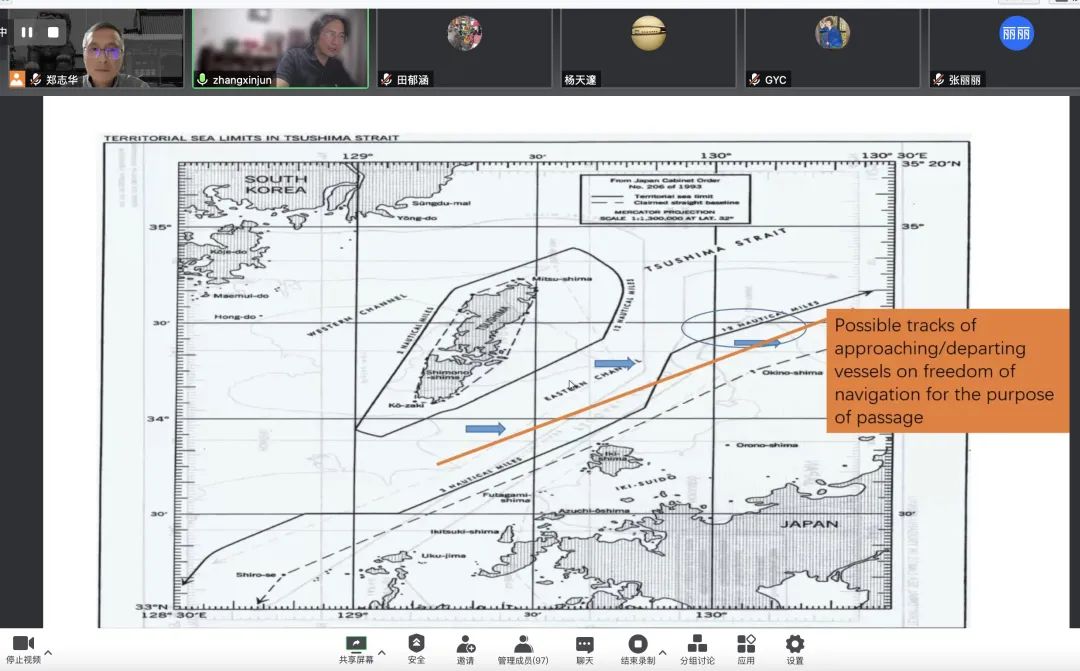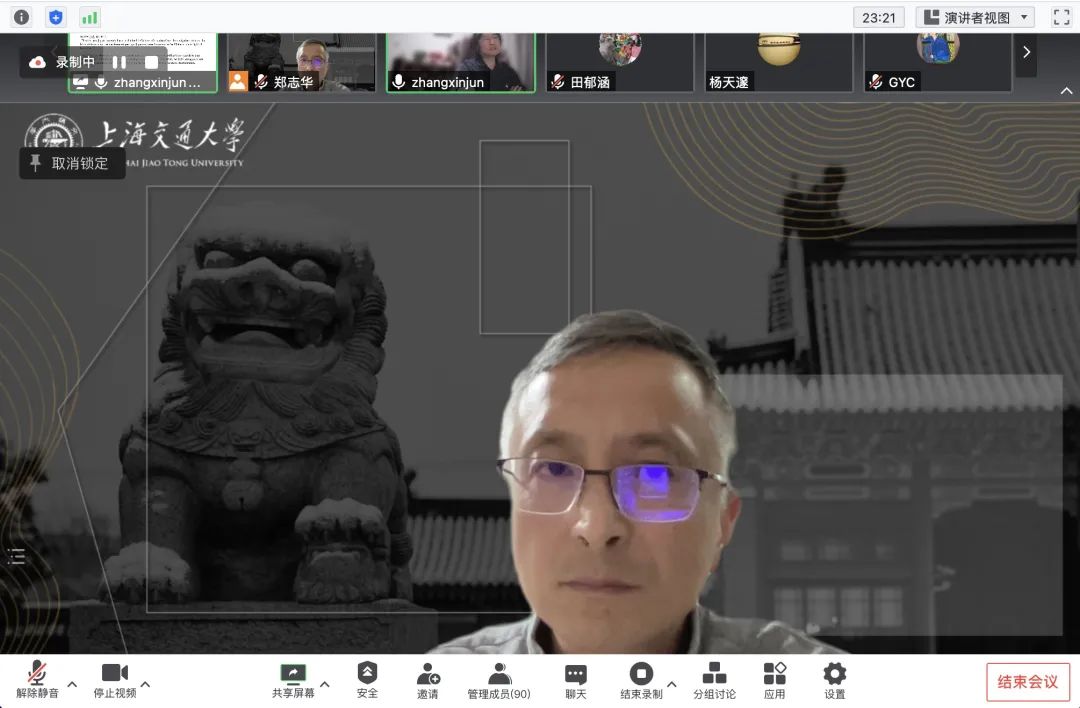On May 16, 2022, the fourth session of the "Series of Lectures on the Practice of the Law of the Sea in Japan" was successfully held online by the Japan Research Center of Shanghai Jiaotong University. This lecture invited Professor Zhang Xinjun of the School of Law of Tsinghua University as the keynote speaker, and Dr. Yan Yan, the director of the Institute of Marine Law and Policy of the South China Sea Research Institute, and Dr. Zhang Shixuan, the assistant researcher of the China South China Sea Research Collaborative Innovation Center of Nanjing University, as participants in the meeting. Zheng Zhihua, associate researcher of Japan Research Center of Shanghai Jiaotong University, presided over the lecture. The theme of this lecture is "the international straits system of the United Nations Convention on the Law of the Sea - Japan's domestic law practice and problems", which comes from the Marine Development and Strategy Research Institute of the Ministry of Natural Resources, Wuhan University, Zhejiang University, Sun Yat sen University, Xiamen University, Southwest University of Political Science and Law, East China University of Political Science and Law, Northwest University of Political Science and Law, Ocean University of China, People's Police University of China, Shanghai University, Shanghai Foreign Studies University More than 130 experts, scholars and graduate students from Dalian Maritime University, Shandong University, Shandong Normal University, Shanghai Institute of International Studies, Ningbo University, Henan University, Zhejiang Foreign Languages Institute, Shanghai Institute of Political Science and Law, Hainan Provincial Party School, Guoguan Think Tank and other institutions attended the lecture.

At the beginning of the lecture, Zheng Zhihua briefly introduced the basic situation of the "Series of Lectures on the Practice of the Law of the Sea in Japan" held by the Japan Research Center of Shanghai Jiao Tong University, the keynote speakers of the lecture, Professor Zhang Xinjun, and the guests of the lecture, Director Yan Yan and Dr. Zhang Shixuan, as well as the process arrangement of the lecture, and expressed a warm welcome to the experts, scholars and students attending the lecture.

Zheng Zhihua, Associate Researcher of Japan Research Center of Shanghai Jiaotong University, hosted a series of lectures
Professor Zhang Xinjun systematically and comprehensively analyzed the application of Japan's domestic law to the straits system, related disputes and international legitimacy issues from five aspects: the importance of the straits in the first island chain and the problems in the passage of the straits, the relevant provisions of the Convention on straits, the practice of Japan's domestic law on "straits for international navigation", the problems in Japan's domestic law, and the prospects for the future. He recalled the history of the development of "straits for international navigation" and related passage systems, and pointed out that the provisions on straits in Part III of the Convention were the product of compromise after the expansion of the territorial sea. Originally, the expansion of the territorial sea should apply innocent navigation, but because of strategic and navigational interests, the Convention established a "transit passage system" and a "strengthened innocent navigation system". He also further introduced the impact of the supplementary provisions of Japan's Territorial Sea Law on the passage of foreign warships by reserving 3 nautical miles of territorial sea width in five specific straits, as well as the nature of the relevant straits outside the five specific straits, and the disputes over the relevant passage rights and obligations. He believes that the most controversial issue at present does not seem to be the five specific straits, but whether the other straits, such as the Tugara Strait, are also "straits used for international navigation". Finally, he analyzed and looked forward to the settlement of relevant disputes, the future trend and whether to resort to dispute settlement mechanisms.

Zhang Xinjun, Professor of Tsinghua University Law School, served as the keynote speaker
In the talk session, Director Yan Yan analyzed the significance of the international straits in combination with the modernization of the navy and how the navy moved towards the Dark Blue. She believes that the Strait is an important channel between the oceans and regional seas. How to ensure the smoothness of the international Strait is related to the remote delivery capability of military forces, which is of great military strategic significance. She also analyzed the dispute over the right of way between China and the Philippines based on the relevant practice of the Philippines in the West Butu Strait. In addition, she also discussed and asked questions about the legal status of the Taiwan Strait and the positions of both sides on the issue of passage through the Taiwan Strait.

Yan Yan, Director of the Institute of Marine Law and Policy of the South China Sea Research Institute, made a speech
Dr. Zhang Shixuan believes that when Japanese scholars talk about "international straits", they refer to the straits used for international navigation in Part III of the Convention, while we usually adopt a broader understanding, and we should pay attention to the conceptual deviation. Secondly, the interpretation dispute between China and Japan not only includes whether the relevant straits are straits subject to the transit passage system, but also includes the different understandings of the specific rights and obligations between the countries bordering the straits and the applicable countries. For example, China believes that the Tugara Strait meets both the geographical requirements and the use requirements, and it is a strait that applies the transit passage system; Japan, on the other hand, believes that in reality, the Tugara Strait is used very infrequently, so the transit passage system should not be applied, but the innocent passage system should be applied. He pointed out that the position of Japanese scholars and government seems to be in a dilemma at present. If Japan adopts the position of the United States on freedom of navigation, it may be a challenge to its own safety.

Zhang Shixuan, Assistant Researcher of China South China Sea Research Collaborative Innovation Center, Nanjing University, made a speech
In the question and discussion session, experts commented on "whether the transit passage system is only applicable to five specific straits", "whether submarines need to surface when passing through the Tugara Strait", "the impact of the three mile narrow territorial sea regulation on the passage of the straits", "the significance of the Kefu Strait case in judging the use of the straits for international navigation" "The relationship between the three non nuclear principles and Japan's determination of the regime of passage through the Straits".
Finally, Zheng Zhihua expressed his thanks to the keynote speaker and the guests for their wonderful sharing. He pointed out that Japan's position on the passage of its Straits is relatively conservative, which is not only far from the freedom of navigation advocated by the United States, but also not fully consistent with its own emphasis on freedom of navigation, especially when its own security interests may be involved. In the future, the Chinese navy will inevitably cross the First Island Chain and related straits more frequently. China and Japan need to reach a consensus on the legal status of the straits and related passage systems, reduce mutual friction and miscalculation, and enhance mutual trust. The wonderful lecture in the evening is not only a feast of knowledge, but also a clue to the direction of future thinking. He thanked the experts and scholars who participated in the discussion, as well as all the teachers and students who attended the lecture, and looked forward to your continuing attention to the series of lectures on "Practice of the Law of the Sea in Japan" hosted by the Japan Research Center of Shanghai Jiaotong University in the future.